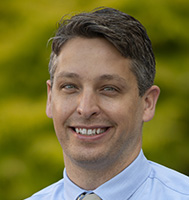Q&A with Dana Irrer, MD, assistant professor, Division of Cardiology
 Hometown: Okemos, Michigan
Hometown: Okemos, Michigan
Educational/professional background: I earned by BS in Mechanical and Biomedical Engineering from Carnegie Mellon University and worked as an artificial heart engineer for a time. I earned my MD from Michigan State University. I completed a combined residency in Internal Medicine and Pediatrics at the University of Minnesota and served as chief resident in Pediatric Cardiology and Adult Congenital Cardiology at the University of Colorado.
Previous position (title, institution): Adult congenital heart disease (ACHD) fellowship, University of Colorado (after a lot of post graduate training)
How would you describe your work to a 5-year-old? I get to help people who are born with heart problems grow up to be adults and live happy and full lives, do the things they love, and even become parents themselves if they want to.
What is your field of research or area of clinical care, and how did you get into it? I love building long-term relationships with the people I get to care for, and I am inspired by what adolescents and adults can accomplish despite the heart disease they were dealt early in life. My research and clinical practice also involve conducting cardiac magnetic resonance imaging (MRI) and developing new methods to explore the heart. As an engineer prior to entering medicine, I realized how a strong collaboration between medicine, engineering, radiology, and physics can show us the heart muscle and how blood flows through the body without necessarily having to perform surgery.
What attracted you to UW–Madison? Definitely the people, the collaboration, and the community. My wife and I grew up in a college town, and the Midwest has always been home. We got a strong sense of this when we were interviewing, but it has already been a privilege to work with a group of people here in pediatric and adult congenital cardiology who do great work, prioritize their patients, and are always willing to have a chat or grab a cup of coffee.
What is your favorite thing to do in Madison? So far, heading out to the farmer’s market as a family on Saturday morning and getting our boys out on bike rides. It’s amazing how much of the community bikes here.
What’s one thing you hope trainees will learn from you and your work? Surgery and clinical care for congenital disease has really come a long way in just the last few decades, and people are living long and full lives. The history of how far we’ve come from the first open heart surgeries in the 1950s is remarkable, and we are learning more about what having congenital heart disease means for the adults in our community. Unfortunately, there are long-term complications that can develop despite cardiac surgery early in life, but I see our role as adult congenital cardiologists to anticipate and prevent those long-term complications so our patients can lead long and happy lives without being hindered by the heart disease they were born with. Plus, the physiology of congenital heart disease is really cool. I’m always available to chat or draw pictures of a patient’s heart.
Do you feel your work relates in any way to the Wisconsin Idea? If so, please describe how. The number of patients with congenital heart disease is growing, and they even outnumber kids with congenital disease. There is a large community throughout Wisconsin who don’t get to see an adult congenital heart disease specialist. As in much of medicine, access issues still disproportionally affect underrepresented minorities and non-gender binary individuals. Part of my goal in being here in Wisconsin is to grow the program and outreach sites to make sure adult patients can have access to the care they need close to home and allow them to help their local communities thrive. ACHD is also a new frontier in medicine, and we have a lot to learn about how heart disease will affect these patients into adulthood. I think the research we do with our population in Wisconsin can help us understand how to care for patients around the world.
What’s something interesting about your area of expertise you can share that will make us sound smarter during video chats and parties? The types of heart surgeries performed on children have come a long way in the last several decades. The first ones looked pretty archaic compared to today’s standards. I’m sure we will look back 20 or 30 years from now and say the same thing about today, but there are still many patients walking around now despite missing major blood vessels or having blood abnormally rerouted through their body because of the surgeries they had in childhood. In the early days of heart surgery, there were patients who had their blood rerouted to a parent’s body or even dog lungs so the surgery could be performed.
What are some of your hobbies and other interests? Biking, cooking (almost as much as eating), family, history of cardiac surgery, and travel.